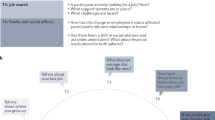Abstract
Most graduate curricula in biological sciences offer courses that cover various scientific disciplines, but they give relatively little formal instruction in experimental design. Students learn the latter primarily through hands-on experience in the laboratory, and some find this learning process bewildering and frustrating. So, what is the root of the problem, and how can young researchers get experiments to work more predictably and reproducibly?
This is a preview of subscription content, access via your institution
Access options
Subscribe to this journal
Receive 12 print issues and online access
$189.00 per year
only $15.75 per issue
Buy this article
- Purchase on Springer Link
- Instant access to full article PDF
Prices may be subject to local taxes which are calculated during checkout


Similar content being viewed by others
References
Kuhn, T. S. The Structure of Scientific Revolutions (ed. Neurath, O.) (Univ. Chicago Press, Chicago, 1970).
Wilson, E. B. An Introduction to Scientific Research (McGraw–Hill, New York, 1952).
Medawar, P. B. Advice to a Young Scientist (Basic Books, New York, 1981).
Grinnell, F. The Scientific Attitude (Westview Press, Boulder, Colorado, 1987).
Barker, K. At the Bench: A Laboratory Navigator (Cold Spring Harbor Laboratory Press, 1998).
Ramón y Cajal, S. Advice for a Young Investigator (MIT Press, Boston, 1999).
Phillips, E. M. & Pugh, D. S. How to Get a PhD: A Handbook for Students and Their Mentors (Open University Press, Buckingham, 2000).
Acknowledgements
I thank S. Miller (Johns Hopkins University, Baltimore, Maryland), R. Behringer (The University of Texas M. D. Anderson Cancer Center, Houston, Texas), F. Watt (London Research Institute, ICRF) and many of my colleagues and students at New York University (NYU) Medical School for critically reading the manuscript. This article is based on the Borden Lecture that I delivered during the 2003 Joint Annual Meeting of the British Societies of Cell Biology and Developmental Biology. The lecture is also a part of a graduate course that I teach, entitled 'Scientific methods: survival skills for young biomedical researchers', which covers experimental design (discussed in this article), critical analysis of scientific literature, scientific writing, oral presentation and scientific integrity. The course has been a requirement for all first-year graduate students of the Sackler Institute of Graduate Biomedical Sciences at NYU Medical School since 2001.
Author information
Authors and Affiliations
Ethics declarations
Competing interests
The author declares no competing financial interests.
Related links
Rights and permissions
About this article
Cite this article
Sun, TT. Excessive trust in authorities and its influence on experimental design. Nat Rev Mol Cell Biol 5, 577–581 (2004). https://doi.org/10.1038/nrm1429
Issue Date:
DOI: https://doi.org/10.1038/nrm1429



